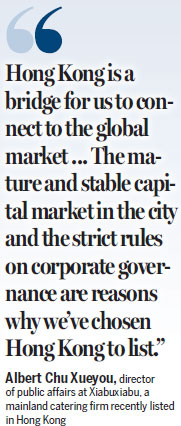HK a magnet for enterprises chasing the global dream
Updated: 2015-03-26 07:22
By Celia Chen in Hong Kong(HK Edition)
|
|||||||
|
The Hong Kong bourse appeals to mainland firms aiming to raise international capital and seeking a global presence. Jerome Favre / Bloomberg |
Editor's note: Hong Kong's new listing market will remain attractive to local and overseas companies in the foreseeable future because it provides an efficient channel to tap international capital, financial professionals forecast.
Hong Kong, as an internationally recognized financial center, offers an ideal platform for initial public offerings (IPOs) to achieve exposure to international funds, said Edmond Chan, co-head of Capital Markets Services at PricewaterhouseCoopers (PwC) Hong Kong.
Xiabuxiabu Catering Management (China) Holdings Co Ltd, a newly Hong Kong-listed company, said the success of its Hong Kong IPO will help it step into a global brand.
"Hong Kong is a bridge for us to connect with the global market," said Albert Chu Xueyou, director of public affairs at Xiabuxiabu.
"The mature and stable capital market in the city and the strict rules on corporate governance are reasons why we've chosen Hong Kong to list," he said.

Ellie Chan, head of research at Shenyin Wanguo Securities (HK) Ltd, predicted that the SAR will continue to strengthen its advantages as an international fund-raising platform.
"The city is even more mature than Singapore in financial market development, I believe," said Ellie Chan. "Investors here are relatively more mature and rational."
Edmond Chan said the city's other attraction as an IPO market is its easy access to further fund and debt raising channels following a new listing.
Hong Kong's established status as an IPO center is reflected in the waiting list of more than 1,000 applicants, stock analysts said.
Trading in the shares of mainland broker GF Securities, which is in the process of raising as much as $3.5 billion in a Hong Kong IPO, is scheduled to start in April. Fuyao Glass, another mainland-based company, has offered to sell shares worth up to $1 billion in its IPO.
Offering shares at a deep discount to the quoted prices of their A shares, the two mainland-listed companies have sparked investors' interest in the IPOs of mainland enterprises.
"Hong Kong IPOs are always preferred when mainland-listed companies try to raise foreign capital and build up an international brand," said Edmond Chan.
Some bankers and stock analysts have expressed concern that the Hong Kong IPO market would be eclipsed by the stock connect program that links it with the Shanghai bourse.
But Edmond Chan said the two markets are so different that they don't overlap each other. "Shanghai, a policy-orientated market, is attractive to mainland investors, while Hong Kong, a market-led economy, appeals to international investors in terms of IPO investment," he said. "Hong Kong will remain competitive even when the stock connect program includes IPOs in the two markets," said Chan from PwC.

"It would take more time for foreign investors to understand mainland IPO investment rules and risks while the Hong Kong investment environment is deeply familiar to them," he said.
The competition among exchanges in Hong Kong, the US and on the Chinese mainland to lure technology companies to list is intensifying, stock analysts said. This has prompted the Hong Kong Stock Exchange to re-consider allowing the dual-class shareholding favored by tech companies, analysts said.
Securities and Futures Commission Chairman Carlson Tong Ka-shing has said companies applying for dual-class shares would have to be restricted to those whose founders hold only small stakes and whose contributions to product innovation are vital to their businesses.
Edmond Chan said Hong Kong should keep pace with the rules and practices of the international capital market in balancing development and investors' protection.
However, Chan of Shenyin Wanguo said she does not believe the dual-class shares structure will hurt investors' interest as companies' management should be caring more about enhancing profitability.
Another challenge is posed by the change in the listing rules on the mainland to a registration-based IPO system rather than one that is approval-based. Some bankers have warned that the reform, if introduced, would induce more mainland enterprises to list on mainland exchanges instead of coming to Hong Kong. "Whether the new system will attract more IPOs on the mainland would depend on the specific policies of the IPO reform," Edmond Chan said.
Ellie Chan, however, said the registration-based system, if introduced on the mainland, could encroach upon the Hong Kong IPO market in the long term.
Hong Kong ranked second last year globally in terms of funds raised in IPOs, according to Thomson Reuters. Mainland-based enterprises raised a total of $21.6 billion in new listings - more than 80 percent of the total.
celia@chinadailyhk.com
(HK Edition 03/26/2015 page9)
